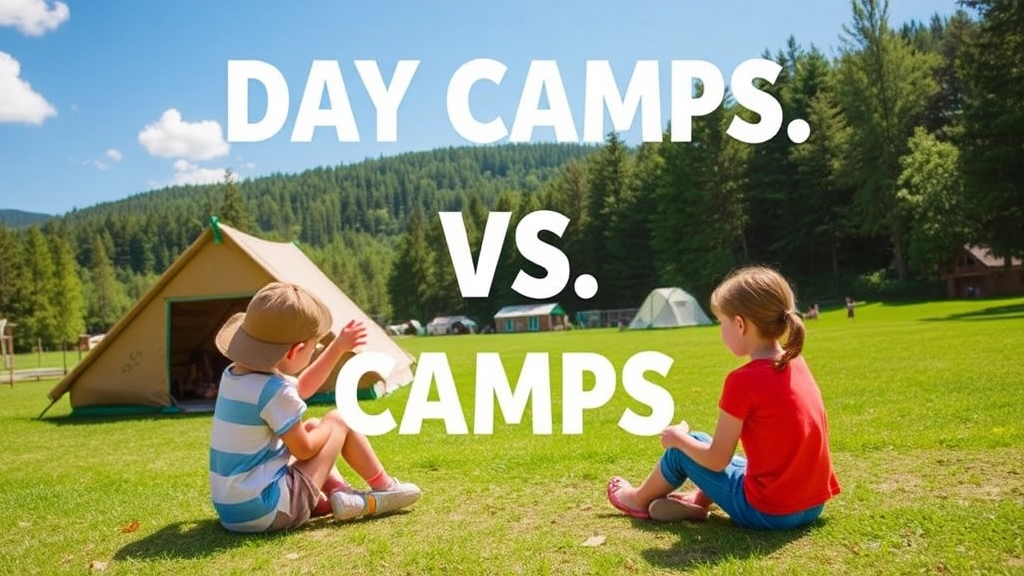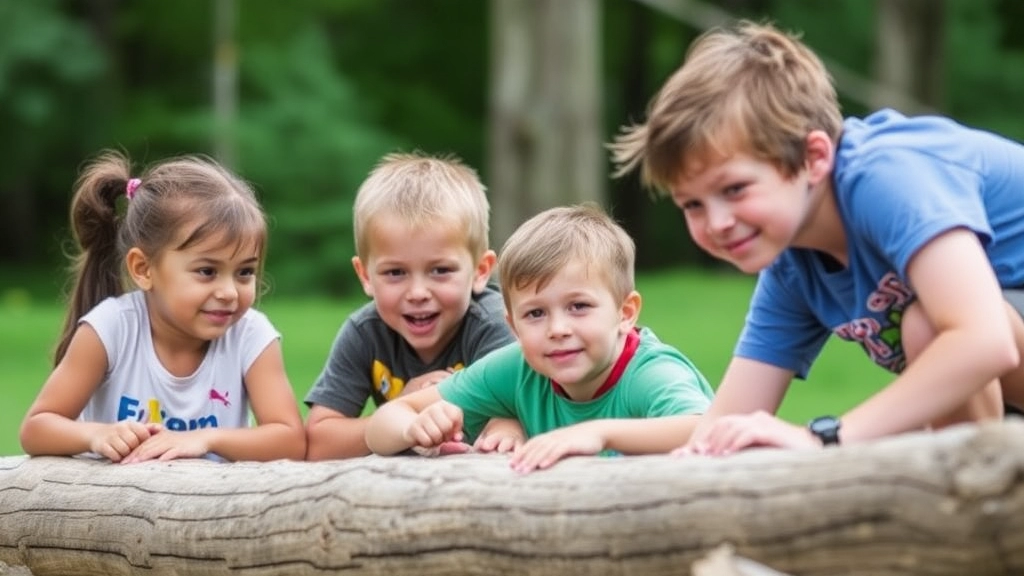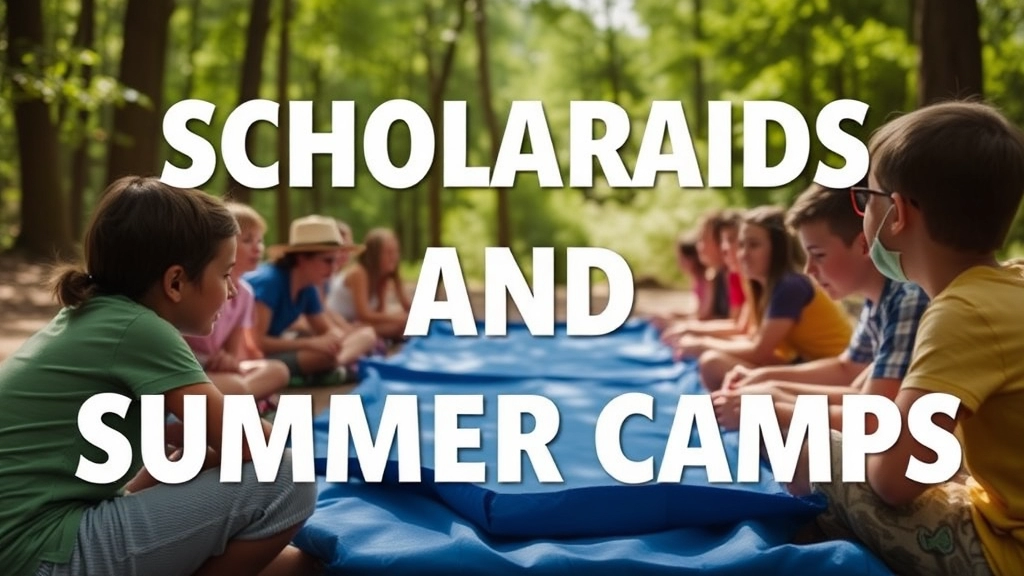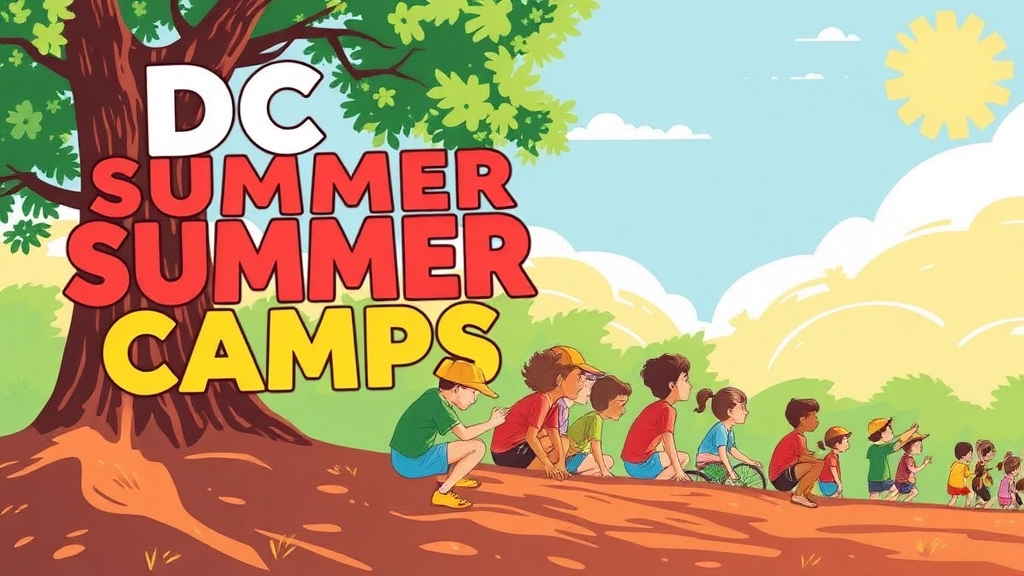Looking for the best DC Summer Camps 2024?
Looking for the best DC Summer Camps 2024 to keep your kids engaged and active? You’re in the right place. Whether you’re considering day camps or overnight adventures, this guide covers everything from sports and arts to STEM and nature explorations. Dive in to find the perfect camp that matches your child’s interests and needs.
Understanding Day Camps vs. Overnight Camps
With a variety of options available, understanding the differences between day camps and overnight camps can help you make an informed decision. We’ll also explore specialised camps like sports, creative arts, and STEM, ensuring there’s something for every young explorer. Plus, get tips on registration deadlines and financial aid to make summer camp planning stress-free.
Top Summer Camps in Washington, DC for 2024
Are you wondering where to send your kids for the summer of 2024? You’re not alone. Many parents are on the hunt for the best summer camps in Washington, DC. The options can be overwhelming, but don’t worry, I’ve got you covered. Here’s a breakdown of some top choices to help you make an informed decision.
Why Choose a Summer Camp in Washington, DC?
Washington, DC, is a fantastic place for summer camps. The city offers a unique blend of history, culture, and natural beauty, making it an ideal setting for a variety of camp experiences. Whether your child is into sports, arts, or science, there’s something here for everyone.
Top Picks for 2024
Smithsonian Summer Camp
- Overview: If your child is a budding historian or scientist, the Smithsonian Summer Camp is a dream come true.
- Activities: From exploring museum exhibits to hands-on science experiments, the camp offers a rich educational experience.
- Age Group: Suitable for children aged 6-14.
- Duration: Weekly sessions throughout the summer.
DC United Soccer Camp
- Overview: Perfect for young athletes looking to improve their soccer skills.
- Activities: Professional coaching, skill drills, and friendly matches.
- Age Group: Open to kids aged 5-16.
- Duration: Options for both day camps and overnight stays.
Camp Arena Stage
- Overview: For the young thespians and artists, Camp Arena Stage offers a creative outlet.
- Activities: Theatre, dance, music, and visual arts.
- Age Group: Designed for kids aged 8-15.
- Duration: Two-week sessions.
National Zoo Camp
- Overview: A paradise for animal lovers.
- Activities: Animal care, wildlife conservation, and behind-the-scenes zoo tours.
- Age Group: Best for children aged 4-12.
- Duration: Weekly sessions.
ID Tech Camps
- Overview: Ideal for tech-savvy kids interested in coding, game development, and robotics.
- Activities: Hands-on projects, coding challenges, and collaborative learning.
- Age Group: Suitable for ages 7-17.
- Duration: One-week sessions.
What Makes These Camps Stand Out?
- Educational Value: Each camp offers a unique learning experience, blending fun with education.
- Professional Staff: Camps are run by experts in their respective fields, ensuring high-quality instruction.
- Diverse Activities: From sports to science, there’s something to keep every child engaged and excited.
Tips for Choosing the Right Camp
- Know Your Child’s Interests: Choose a camp that aligns with your child’s passions.
- Check Reviews: Parent testimonials can provide valuable insights into the camp’s quality.
- Visit the Camp: If possible, visit the camp beforehand to get a feel for the environment.
If you’re interested in exploring camps outside of Washington, DC, you might want to check out the top summer camps in Rochester, NY or even the best summer camps in Amarillo for 2024. These options provide a variety of activities and experiences that could be perfect for your child.
Day Camps vs. Overnight Camps: Pros and Cons

Alright, let’s talk about a big decision for summer camps: Day Camps vs. Overnight Camps.
Ever wondered which is better for your kid? I’ve been there.
Day Camps:
Pros:
- Close to Home: Your child gets to come back home every evening. Great for younger kids or first-timers.
- Flexibility: Pick and choose the days that work for you. No need to commit to a whole week.
- Cost: Generally cheaper than overnight camps. Less strain on the wallet.
- Routine: Kids can stick to their home routines. Sleep in their own beds, eat familiar food.
Cons:
- Limited Exposure: Less time to bond with other campers. They might miss out on some late-night fun.
- Transport: You’ll need to handle drop-offs and pick-ups. Could be a hassle if you’ve got a busy schedule.
- Shorter Duration: Activities are limited to daytime. No campfires, no stargazing.
Overnight Camps:
Pros:
- Immersive Experience: Kids live and breathe camp life 24/7. Deep bonds and lifelong memories.
- Independence: Teaches self-reliance. They learn to take care of themselves without parents around.
- Unique Activities: Night-time adventures, extended projects, and more comprehensive programs.
- Break for Parents: Let’s be real, you get some downtime too.
Cons:
- Homesickness: Younger kids might struggle being away from home. It’s a big step.
- Cost: More expensive. You’re paying for accommodation and meals.
- Commitment: You’re locked in for the duration. No easy way out if it doesn’t work out.
- Safety Concerns: Trusting someone else with your child 24/7 can be nerve-wracking.
Quick Comparison:
| Aspect | Day Camps | Overnight Camps |
|---|---|---|
| Cost | Lower | Higher |
| Duration | Daytime only | 24/7 |
| Independence | Less | More |
| Activities | Limited to day | Extended, night-time |
| Parental Involvement | High (pick-ups/drop-offs) | Low (you get a break) |
| Homesickness | Rare | Possible |
Real Talk:
Think about your child’s personality.
Are they ready to be away from home?
Do they thrive with constant activity or need their downtime?
Personal Story:
When I was a kid, I loved overnight camps.
The thrill of being away from home, the late-night ghost stories, and the sense of freedom were unbeatable.
But, my little sister?
She preferred day camps.
She liked coming home, telling us about her day, and sleeping in her own bed.
Final Thoughts:
Choosing between day camps and overnight camps boils down to what fits your child’s needs and your family’s schedule.
Both have their perks and challenges.
So, what’s it going to be?
Day camp or overnight camp?
Drop your thoughts below!
Specialty Camps: Sports, Arts, and More
Are you wondering which specialty camp is right for your child? With so many options available, it can be overwhelming to choose the perfect fit. Let’s dive into the various specialty camps, from sports to arts and more, so you can make an informed decision.
Sports Camps: Building Skills and Team Spirit
What are sports camps?
Sports camps focus on specific athletic activities, helping children improve their skills in a particular sport. Whether it’s football, basketball, swimming, or tennis, there’s a camp for every young athlete.
Benefits of sports camps:
- Skill Development: Camps provide professional coaching and structured training, helping kids enhance their abilities.
- Teamwork: Participating in team sports fosters collaboration and communication.
- Physical Fitness: Regular physical activity promotes overall health and well-being.
- Confidence: Mastering new skills boosts self-esteem and encourages a growth mindset.
Example:
Imagine your child returning home after a week at a football camp, brimming with excitement as they recount the new techniques they’ve learned and the friends they’ve made. That’s the power of a well-structured sports camp.
Arts Camps: Nurturing Creativity and Expression
What are arts camps?
Arts camps cater to budding artists, offering programs in visual arts, music, theatre, dance, and more. These camps provide a platform for children to explore and develop their creative talents.
Benefits of arts camps:
- Creative Expression: Kids have the freedom to express themselves through various art forms.
- Skill Enhancement: Professional instructors guide children in honing their artistic skills.
- Cultural Exposure: Exposure to different art forms broadens cultural understanding and appreciation.
- Confidence: Performing or showcasing their work can significantly boost a child’s confidence.
Example:
Think of your child performing in a theatre production or showcasing their artwork at an exhibition. The pride and joy they feel is unmatched, and it’s all thanks to the nurturing environment of an arts camp.
Other Specialty Camps: Diverse Interests and Passions
What are other specialty camps?
Beyond sports and arts, there are camps tailored to a wide range of interests, including cooking, robotics, coding, and even chess. These camps allow children to delve into their passions and discover new ones.
Benefits of other specialty camps:
- Focused Learning: Specialised camps offer in-depth exploration of specific subjects.
- Passion Development: Kids can pursue their interests in a structured setting.
- Skill Acquisition: Camps provide hands-on experience and practical knowledge.
- Networking: Children meet peers with similar interests, fostering friendships and collaborations.
Example:
Picture your child attending a coding camp, where they learn to build their first app or game. The sense of accomplishment and the practical skills gained are invaluable.
Choosing the Right Specialty Camp
When selecting a specialty camp, consider the following factors:
- Interests and Passions: Choose a camp that aligns with your child’s interests.
- Skill Level: Ensure the camp caters to your child’s current skill level, whether beginner or advanced.
- Location and Duration: Consider the camp’s location and whether it’s a day camp or overnight camp.
- Cost: Evaluate the camp fees and any additional expenses.
For more insights on the benefits of summer camps, check out our article on why summer camps matter for kids’ growth. If you’re looking for some creative inspiration for your camp flyers, don’t miss our collection of free clip art ideas for summer camp flyers.
STEM Camps: Science, Technology, Engineering, and Math

Ever wondered if your kid could be the next tech genius or science whiz?
STEM camps in Washington, DC, for 2024 might just be the answer.
These camps are designed to spark curiosity and build skills in Science, Technology, Engineering, and Maths.
Why Choose STEM Camps?
STEM camps aren’t just about learning; they’re about doing.
Kids get hands-on experience with real-world problems.
They build robots, code apps, and even conduct experiments.
Imagine your child coming home with a robot they built from scratch.
Or an app they coded themselves.
Key Benefits
- Skill Development: From coding to critical thinking, STEM camps cover it all.
- Teamwork: Kids collaborate on projects, learning to work as a team.
- Problem-Solving: They tackle real-world problems, boosting their problem-solving skills.
- Fun and Engaging: These camps make learning fun with interactive projects.
Types of STEM Camps
- Robotics Camps: Perfect for kids who love building and programming robots.
- Coding Camps: Ideal for future software developers and tech enthusiasts.
- Science Camps: For those curious about the natural world, from chemistry to biology.
- Engineering Camps: Focused on building and designing structures and machines.
- Math Camps: Great for kids who enjoy puzzles and want to enhance their mathematical skills.
Real Stories
I remember a parent telling me how their child built a drone at a STEM camp.
The kid was just 10 years old.
The excitement and pride in their eyes were priceless.
Another parent shared how their shy child found confidence through teamwork in a coding camp.
These are not just camps; they are life-changing experiences.
Tips for Choosing the Right STEM Camp
- Check the Curriculum: Make sure it aligns with your child’s interests.
- Look for Qualified Instructors: Experts who can make complex topics easy to understand.
- Read Reviews: Parent testimonials can give you a good idea of what to expect.
- Visit the Camp: If possible, visit the camp to see the facilities and meet the staff.
Outdoor Adventure Camps: Nature and Exploration
Are you worried about your child spending too much time indoors and glued to screens? Do you want them to experience the great outdoors and learn valuable skills? Outdoor adventure camps in Washington, DC for 2024 might be the perfect solution. These camps offer a blend of nature, exploration, and hands-on learning that can be both fun and educational.
Why Choose Outdoor Adventure Camps?
Outdoor adventure camps provide children with unique opportunities to explore nature, develop new skills, and build self-confidence. Here’s why they might be the best choice for your child:
- Nature Immersion: Kids get to experience the beauty of nature, from hiking trails to rivers and forests.
- Physical Activity: These camps encourage physical fitness through activities like hiking, climbing, and kayaking.
- Skill Development: Children learn practical skills such as navigation, survival techniques, and environmental stewardship.
- Social Interaction: Campers build friendships and improve their teamwork abilities through group activities.
Popular Outdoor Adventure Camps in Washington, DC
- Camp Horizons: Located in the Shenandoah Valley, Camp Horizons offers a variety of outdoor activities including rock climbing, horseback riding, and zip-lining.
- NatureBridge: Situated in the Prince William Forest Park, NatureBridge focuses on environmental education and outdoor exploration.
- Adventure Links: This camp offers day and overnight programs with activities like canoeing, rock climbing, and caving.
Activities to Expect
Outdoor adventure camps are packed with exciting activities that keep children engaged and learning. Here’s a glimpse of what they might experience:
- Hiking and Backpacking: Exploring trails and learning about local flora and fauna.
- Water Sports: Kayaking, canoeing, and swimming in natural water bodies.
- Climbing and Rappelling: Building strength and overcoming fears on rock walls and natural cliffs.
- Survival Skills: Learning how to build shelters, start fires, and find food in the wild.
- Team Building: Group challenges and games that promote cooperation and problem-solving.
Benefits of Outdoor Adventure Camps
The benefits of sending your child to an outdoor adventure camp are numerous:
- Improved Physical Health: Regular physical activity helps in maintaining a healthy weight and improving overall fitness.
- Mental Well-being: Being in nature reduces stress and anxiety, fostering a sense of peace and relaxation.
- Confidence Boost: Overcoming physical challenges and learning new skills boost self-esteem.
- Environmental Awareness: Children develop a deeper appreciation for nature and learn the importance of conservation.
Real Stories from Parents
One parent shared, âSending my daughter to Camp Horizons was the best decision we made last summer. She came back more confident and with a newfound love for nature.â Another parent noted, âNatureBridge not only taught my son about the environment but also instilled in him a sense of responsibility towards it.â
Preparing for an Outdoor Adventure Camp
To ensure your child has the best experience, consider these tips:
Camps for Different Age Groups: Tailored Experiences

Ever wonder if your child is too young or too old for a summer camp?
Yeah, me too.
Finding the right camp for your child’s age can feel like a puzzle.
But when you nail it, it’s magic.
Why Tailored Camps Matter
Kids are like sponges.
They soak up everything around them.
So, the right camp can boost their confidence, skills, and friendships.
But if the camp is off, it can be a disaster.
Age-Specific Camps: The Breakdown
Here’s the scoop:
Pre-Schoolers (Ages 3-5)
- Focus: Fun and safety.
- Activities: Simple crafts, nature walks, and storytime.
- Why it works: Keeps their short attention spans engaged.
Early Elementary (Ages 6-8)
- Focus: Exploration and social skills.
- Activities: Sports, basic science experiments, and group games.
- Why it works: They start making friends and discovering interests.
Tweens (Ages 9-12)
- Focus: Independence and skill-building.
- Activities: Team sports, advanced arts and crafts, and beginner coding.
- Why it works: They crave some independence and love mastering new skills.
Teens (Ages 13-17)
- Focus: Leadership and specialised interests.
- Activities: Leadership workshops, advanced STEM projects, and outdoor adventures.
- Why it works: Prepares them for future challenges and lets them dive deep into their passions.
Personal Stories: Real Parents, Real Kids
Take Sarah, for instance.
She sent her 7-year-old to a camp designed for older kids.
He felt lost and overwhelmed.
Next year, she chose an age-appropriate camp.
He thrived.
Made friends.
Learned new skills.
Came home happy.
Tips for Choosing the Right Camp
- Read Reviews: Parent testimonials can be gold.
- Visit the Camp: See it in action.
- Talk to Directors: Ask about age-specific activities.
- Check Schedules: Make sure the activities fit your child’s interests.
Registration Tips and Deadlines
Are you worried about missing out on the best summer camps in Washington, DC for 2024? You’re not alone. Every year, parents scramble to secure spots in top camps, only to find out they’ve missed the boat. Let’s dive into some essential registration tips and deadlines to ensure your child doesn’t miss out.
Start Early: The Early Bird Gets the Worm
Why Wait? Most summer camps open their registration as early as January. The top spots can fill up within days. Here’s why starting early is crucial:
- Best Selection: The earlier you register, the more options you’ll have.
- Discounts: Many camps offer early bird discounts, saving you money.
- Peace of Mind: Secure your child’s spot and avoid last-minute stress.
Mark Your Calendar: Key Deadlines
Don’t Miss Out: Keep an eye on these critical deadlines to avoid disappointment:
- January to March: Prime registration period for most camps.
- April to May: Last call for many camps, although some may still have spots.
- June: Emergency registration for late planners, but choices will be limited.
Pro Tips for Smooth Registration
Make It Easy: Follow these steps to streamline the registration process:
- Research Early: Compile a list of potential camps by December.
- Set Reminders: Use your phone or calendar to set alerts for registration dates.
- Prepare Documents: Have all necessary paperwork ready, including medical forms and emergency contacts.
- Create Accounts: Many camps require online accounts. Set these up beforehand to avoid delays.
- Stay Flexible: Have a backup camp or two in mind in case your first choice is full.
Financial Planning: Budgeting for Camp
Avoid Sticker Shock: Summer camps can be pricey. Here’s how to budget effectively:
- Early Bird Discounts: As mentioned, registering early can save you money.
- Payment Plans: Some camps offer instalment plans to spread out the cost.
- Scholarships and Financial Aid: Look into financial aid options to ease the burden.
Real Stories: Lessons from Fellow Parents
Sharing is Caring: Here are some insights from parents who’ve been through the process:
- Jane, a mother of two: “I missed the registration deadline last year and had to settle for a less-than-ideal camp. This year, I set reminders and managed to snag spots at our top choice!”
- Mark, a single dad: “I found out about a scholarship program that covered half the cost. Don’t hesitate to ask camps about financial aid options.”
Last-Minute Tips: What if You’re Late?
All is Not Lost: If you’ve missed the early registration window, consider these options:
- Waitlists: Many camps have waitlists. Sign up and you might still get in.
- Local Camps: Smaller, local camps may have more availability.
- Day Camps: These often have more flexible registration deadlines compared to overnight camps.
For a comprehensive guide on summer camp packing, check out our Ultimate Summer Camp Packing Checklist. If you’re interested in camps specifically in Huntsville, Alabama, don’t miss our Top Picks and Guides for Summer Camps in Huntsville, AL.
Financial Aid and Scholarships for Summer Camps

Worried about the cost of sending your kid to summer camp?
You’re not alone.
Many parents stress about the price tag attached to these enriching experiences.
But here’s the good news: financial aid and scholarships can make it happen.
Why Consider Financial Aid and Scholarships?
First off, let’s get real.
Summer camps can be pricey.
But they offer invaluable experiences for your child.
From making new friends to picking up new skills, it’s worth every penny.
Still, not everyone has the budget for it.
That’s where financial aid and scholarships come in.
Types of Financial Aid Available
There are different types of financial aid you can tap into:
- Need-Based Aid: This is for families who genuinely need financial support.
- Merit-Based Scholarships: Got a kid who’s a star in sports, arts, or academics? These scholarships are for them.
- Community Grants: Sometimes, local organisations or businesses sponsor kids for camps.
Where to Look for Scholarships?
You might be wondering, “Where do I start?”
Here are some places to check:
- Camp Websites: Always start here. Many camps have their own financial aid programs.
- Local Community Centres: They often have information on grants and scholarships.
- Online Databases: Websites like Scholarship.com or Fastweb can be goldmines for finding aid.
Tips for Applying
Applying for financial aid can feel like a maze.
But don’t worry, I’ve got you covered:
- Start Early: Deadlines can sneak up on you. The earlier you start, the better.
- Gather Documents: You’ll need things like tax returns, pay stubs, and maybe even a letter explaining your financial situation.
- Write a Strong Application: Highlight your child’s achievements and why they deserve the scholarship.
Real Stories
Let me share a quick story.
A friend of mine was in the same boat last year.
She found a local grant that covered 80% of the camp fee for her son.
He had the time of his life, and she didn’t break the bank.
Final Thoughts
Financial aid and scholarships can make summer camps accessible for everyone.
Don’t let the cost hold you back.
Explore your options, apply early, and give your child the summer they deserve.
Parent Reviews and Testimonials
Real Questions and Worries
As parents, we all have questions and worries when it comes to sending our children off to summer camp. Will they be safe? Will they make friends? Will they enjoy the activities? These concerns are completely normal and shared by many. To help ease your mind, we’ve gathered parent reviews and testimonials from those who have been through the process.
Honest Insights From Fellow Parents
Safety and Security
Safety is a top priority for any parent. Here’s what some parents had to say about the safety measures at various camps in Washington, DC:
- John, father of two: “I was initially worried about the safety protocols, but after visiting the camp and speaking with the staff, I felt reassured. They have strict guidelines and trained personnel to handle emergencies.”
- Sarah, mother of a 10-year-old: “The camp had a comprehensive safety plan, including regular drills and medical staff on-site. I felt confident leaving my child there.”
Making Friends and Social Interaction
One of the biggest concerns is whether your child will make friends and enjoy their time at camp. Here’s some feedback from parents:
- Emily, mother of a shy 8-year-old: “My daughter was nervous about making friends, but the camp counsellors were fantastic at helping her integrate. She came back with a bunch of new friends and a boost in confidence.”
- Michael, father of a 12-year-old: “The camp’s emphasis on teamwork and group activities really helped my son come out of his shell. He talks about his camp friends all the time.”
Enjoyment and Activities
The variety and quality of activities can make or break a camp experience. Parents shared their thoughts on this aspect:
- Linda, mother of a sporty 9-year-old: “The sports camp was perfect for my son. He got to try new sports and improve his skills. He loved every minute of it.”
- Tom, father of an artistic 11-year-old: “My daughter attended an arts camp and it was incredible. She learned so much and even brought home some amazing artwork. She can’t wait to go back next year.”
Key Takeaways
To summarise the feedback from parents:
- Safety: Camps in Washington, DC, take safety seriously with strict protocols and trained staff.
- Social Interaction: Camps provide a supportive environment for making friends and building social skills.
- Activities: There is a wide range of activities tailored to different interests, ensuring that every child has a great time.
Real Stories Over Coffee
Imagine sitting down with a friend over coffee, sharing stories about summer camps. Here are a few more insights:
- Anna’s Story: “I was so worried about my son being away from home for the first time. But when he came back, he couldn’t stop talking about the campfire stories and the new skills he learned. It was a transformative experience for him.”
- James’s Experience: “My daughter was hesitant about going to a STEM camp, but she ended up loving it. She discovered a passion for robotics and even won a small competition. It was amazing to see her so excited about learning.”
For more tips on ensuring a positive camp experience, check out our Essential Guide for Summer Camp Leaders.
Preparing Your Child for Summer Camp
So, your kiddo is off to summer camp. Exciting, right?
But let’s be real, it’s also a bit nerve-wracking.
How do you make sure they’re ready?
Address Their Concerns
First things first, talk to your child.
Ask them what they’re excited about and what worries them.
Questions to ask:
- What are you looking forward to?
- Anything you’re nervous about?
- What do you want to know more about?
Pack Smart
Packing can be a headache.
But it doesn’t have to be.
Here’s a quick list:
- Essentials: Clothes, toiletries, medications
- Comfort items: A favourite stuffed animal or blanket
- Activity gear: Sports equipment, art supplies
Practice Independence
Camp is all about independence.
Help them get a head start.
Tips:
- Teach them to make their bed.
- Show them how to pack and unpack their bag.
- Practice good hygiene routines.
Social Skills 101
Meeting new people can be intimidating.
Role-play scenarios:
- Introducing themselves
- Asking to join a game
- Sharing and taking turns
Health and Safety
Health and safety are biggies.
Make sure they know:
- Emergency contacts: Who to call and when
- Basic first aid: How to treat minor cuts and scrapes
- Camp rules: What’s allowed and what’s not
Stay Connected
Homesickness is real.
But staying connected can help.
Ideas:
- Pack pre-addressed, stamped envelopes for letters home.
- Arrange a call schedule if the camp allows it.
Final Checklist
Before they go, run through a final checklist.
Things to confirm:
- All forms are filled out.
- Medications are packed.
- Contact info is updated.
Real Talk: Stories and Examples
When I went to camp as a kid, I was terrified of making new friends.
But guess what?
I met my best mate there.
Tell your child stories like this.
It makes the whole experience feel more real and less scary.
FAQs About DC Summer Camps 2024
What are the main differences between day camps and overnight camps?
Day camps allow children to return home each evening, offering flexibility and lower costs. Overnight camps provide an immersive experience where kids stay 24/7, fostering independence and deeper bonds.
What are the benefits of enrolling my child in a STEM camp?
STEM camps offer hands-on learning in Science, Technology, Engineering, and Math. They help develop skills like coding, critical thinking, and teamwork, making learning engaging and fun.
How do I choose the right camp for my child’s age group?
Look for camps tailored to specific age groups. Pre-schoolers need fun and safety-focused activities, while teens benefit from leadership and specialized interest programs. Always check the camp’s curriculum and reviews.
Are there financial aid and scholarship options available for summer camps?
Yes, many camps offer need-based aid, merit-based scholarships, and community grants. Start early, gather necessary documents, and write a strong application to increase your chances of receiving aid.
What should I consider when deciding between day camps and overnight camps?
Consider your child’s readiness to be away from home, your budget, and your family’s schedule. Day camps are great for younger kids and those who prefer routine, while overnight camps are ideal for fostering independence and deeper camp experiences.
What types of activities can my child expect at a STEM camp?
Activities vary but often include building robots, coding apps, conducting science experiments, and solving real-world problems. These camps are designed to be interactive and engaging.
How can I find the right camp for my child?
Read reviews, visit the camp, and talk to camp directors. Ensure the camp’s activities align with your child’s interests and that the staff is qualified and experienced.
What are some real-life benefits parents have noticed from sending their kids to summer camps?
Parents have reported increased confidence, new friendships, and skill development in their children. Camps can be life-changing experiences that provide both fun and educational value.
Are there specific camps for different age groups?
Yes, camps often tailor their programs to different age groups. For example, pre-schoolers (ages 3-5) focus on simple crafts and nature walks, while teens (ages 13-17) engage in leadership workshops and advanced STEM projects.
What should I look for in a camp’s curriculum to ensure it’s a good fit for my child?
Ensure the curriculum aligns with your child’s interests and developmental stage. Look for a variety of activities that promote both learning and fun, and check for qualified instructors who can engage children effectively.
References
-
Day Camp vs. Overnight Camp: Which is Best for Your Child?
-
Day Camp vs. Overnight Camp: Weighing the Pros and Cons
-
Pros and Cons of Sending Your Kids to Summer Camp

